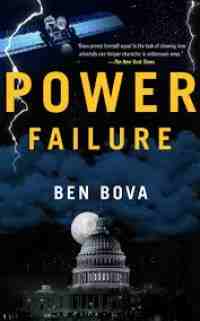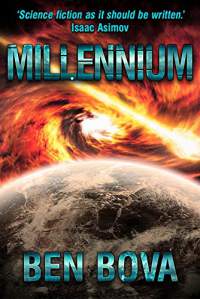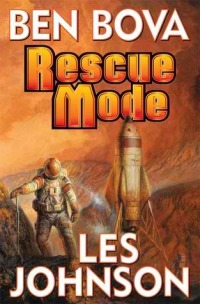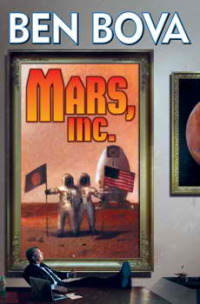Power Failure by Ben Bova
 Friday, January 4, 2019 at 6:28AM
Friday, January 4, 2019 at 6:28AM 
Published by Tor Books on October 9, 2018
Power Failure represents a failure of the imagination. Ben Bova is an old-school cheerleader for exploration of the solar system. Reflecting that obsession, Bova’s recent novels have been about overcoming political barriers to manned missions to Mars. Apparently having flogged that horse enough, he has set his sights on a closer goal: overcoming political barriers to colonizing the moon.
One of Bova’s recent Mars books focused on NASA and crewed missions to Mars; the other had private enterprise taking the initiative. In Power Failure, Bova images a private-public cooperative model in which NASA and private businesses share the mission of crewed space exploration. I have to assume that Bova intends the book as a blueprint for how government and the private sector should work together to get crewed space exploration moving forward. His characters certainly make enough speeches outlining the familiar benefits (jobs, technology spinoff) of investing in a future beyond our planetary boundaries. I agree with most of what those characters say, but speeches rarely translate into compelling fiction.
The novel also touches on some of Bova’s favorite rants, including the failure of schools to concentrate on STEM subjects that are likely to build interest in the space program (as opposed to teaching subjects that might build interest in things that are of less consequence to Bova). Bova seems to be convinced that kids will be excited about STEM subjects if they get a chance to meet a real astronaut, further evidence that Bova is stuck in the past. He is clueless and condescending when it comes to the challenges facing the nation’s schools. Bova sounds like a cranky old man when he takes shots at teachers who fail to get kids interested in aerospace engineering.
The plot focuses on Republican Senator Franklin Tomlinson who, in his second senate term, decides to run for president as a tribute to his dead father. He needs a campaign issue that will elevate him above the status of dark horse. Bova, being Bova, remains convinced that voters will become enthused about a candidate who focuses not on healthcare or immigration or the economy but on the space program. Seriously?
Bova’s suggestion that Russians will jump at the chance to cooperate with America in exploring space is a standard means of shilling for the space program, but it doesn’t reflect political reality. Modest cooperative efforts (like the space station) have done little to lessen tensions between the two countries. I’m a firm supporter of the space program, but it isn’t the panacea for international peace that Bova imagines it to be.
Bova moves from science fiction to fantasy when he posits that running on a science-based issue is how Tomlinson will energize voters in a Republican primary. Bova acknowledges that a substantial number of Republican voters want to stop stem cell research, are hostile to the science that explains global warming and evolution, think sex education should avoid teaching contraception, and believe that mining American coal is the road to energy independence. Given that so many Republican voters are hostile to science, it’s shocking that Bova fails to explain how basing a political campaign on science will reach a base of voters who take pride in their ignorance.
The driving force behind Tomlinson’s moon plan is Jake Ross, who had a fling with the senator’s wife before the senator married her. Jake is the senator’s science advisor and is now married to Tami. Bova dangles the possibility of hanky-panky to try to enliven the plot, but it’s clear that the politics behind the moon mission are all he really cares about. To the extent that Bova believes a nonexistent sex scandal involving Tomlinson’s wife (who — horrors! — had dinner with a man while her husband was out of town) can ruin a Republican’s chance of being elected president, he apparently doesn’t keep up with the news. Ross ends up dealing with that scandal why? Aren’t scandals the responsibility of the chief of staff? Or the media relations staffer? Bova’s belief that scandals still exist, like his belief that science advisors play a critical role in political campaigns, is further evidence that he continues to write science fiction that might have been published in the 1950s.
The turmoil of a gay character is probably supposed to add currency to the plot, but it still feels like a 1950s attitude about the difficulties experienced by gay men. He also tosses in a conflict between Jake, who wants to stay in DC as the president’s science advisor if Tomlinson wins, and his wife, who wants to be a news anchor in Fresno. Those scenes are least might have been written in the 1970s —until Jake’s wife [spoiler alert] decides to be dutiful by sacrificing her career to remain at her husband’s side. It’s Ozzie and Harriet all over again.
As a seasoned writer, Bova knows he needs to add some dramatic tension to the plot. He does that a couple of times by placing characters in life-endangering situations. Those were the only parts of the novel that made me feel I wasn’t attending a lecture delivered by a stuffy pedant. The novel feels so dated and has little to say that hasn't already been said.
NOT RECOMMENDED


